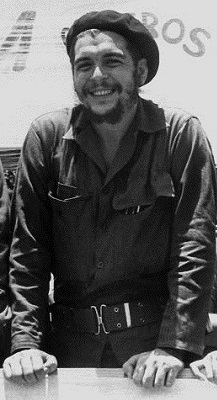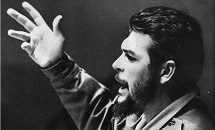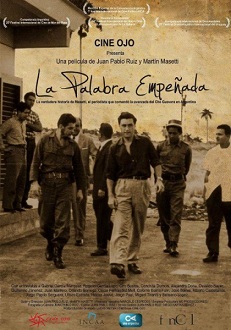|
~ Ernesto Che Guevara
~ Galéria
~ Oldal
~ Bejelentkezés
~ Vissza a Főoldalra
Ernesto Che Guevara, az argentin származású forradalmár, miniszter, gerillavezér és író, Buenos Aires-ben szerzett orvosi diplomát, majd a kubai forradalom során jelentős szerepet játszott a szigetország felszabadításában és újjáépítésében. A kubai gazdaság talpraállításáért dolgozott, küzdött az oktatás és az egészségügy fejlesztéséért, az írástudatlanság és a faji előítéletek felszámolásáért. Saját példájával népszerűsítette az önkéntes munkát. Kongóban és Bolíviában is harcolt - harminckilenc éves volt, amikor az amerikai-bolíviai csapatok csapdába ejtették és kivégezték.
| | |
|

| | |
|
|
|
Video collection
|
|
|
I just would love to let everyone know that beside a photo gallery (with more than 3,000 photos so far) this website also has got a collection of videos that you can check out by clicking on the photo below:

or by clicking on Ernesto Che Guevara > Video Collection.
You can you watch here more than 30 videos:
~ Che's speeches (in audio and/or video form)
~ Che's interviews
~ rare footage like Che's first speech on Radio Rebelde or his reciting poems
~ documentary films about Che
(In case a video doesn't work, please let me know.)
|
|
|
| 2014.04.29. 21:42, Aleida |
La palabra empeñada
|
|
|
 La palabra empeñada is a documentary film, released in 2010. La palabra empeñada is a documentary film, released in 2010.
It shows the life of the famous Argentinian journalist and guerrilla, Jorge Ricardo Masetti through archive footage and interviews with people who knew him well like his friend, the Nobel-awarded writer, Gabriel García Márquez, the historian Osvaldo Bayer, the journalist Rogelio García Lupo and Conchita Dumois, who was his secretary and his second wife.
Masetti went to the Sierra Maestra in 1958 to make an interview with Fidel Castro and Che Guevara. He became a close friend of Che, they founded the Prensa Latina, the Latin American news agency and they prepared a guerrilla campaign (Ejército Guerrillero del Pueblo (EGP) in Argentina. Masetti led the campaign under the name El Comandante Segundo (The second commander) and he disappeared in the Argentinian jungle in 1964 after the EGP failed.
The film was shot in Cuba and the Northeast Argentina.
[Watch La palabra empeñada]
[Read the interview with Juan Pablo Ruiz - in Spanish]
|
|
|


| 2014.04.23. 16:21, Aleida |
Che Guevara Archives: film & video
|
Egyszerűen fantasztikus anyagot hoztam mára - miközben azt a videót kerestem, amelyen Che Guevara egy versből idéz, újabb, izgalmas archív felvételekre bukkantam a youtube-on!
[Video: Leon Felipe - La rosa de harina]
Három rövid videón látható és hallható, amint Che Guevara egy beszéde közben Leon Felipe versét, a La Rosa de harina-t mondja el - kissé hiányosan, amint az alatta közölt versszöveg segítségével ellenőrizhető - igaz, még a versmondás közben mosolyogva közli, hogy rossz a memóriája.
[Video: César Vallejo - Los Heraldos Negros]
Ez a felvétel egy filmből való (Che, un hombre nuevo (2010) és Che Guevara a perui költő, César Vallejo Los Heraldos Negros című versét mondja - ezt egy kazettán küldte el a feleségének, Aleida-nak, miközben Bolíviában harcolt. Aleida és a gyermekei beleegyeztek, hogy a filmben bemutathassák ezt az értékes hanganyagot.
[Film: Che, un hombre nuevo]
Számtalan film készült már Che Guevara-ról, azonban a 2010-ben megjelent Che, un hombre nuevo az egyetlen, amely Aleida March és négy gyermeke engedélyével és segítségével készült el. Bő kétórás film, több, korábban még nem látott/nyilvánosságra nem hozott archív film- és hanganyag felhasználásával.
A film spanyol nyelvű.
|
|
I have brought you a simply fantastic material for today - while I was looking for a video in which Che Guevara is quoting a poem during one of his speeches, I found some more, exciting archive footage on youtube!
[Video: Leon Felipe - La rosa de harina]
On three short clips you can see and hear Che Guevara reciting Leon Felipe's poem La Rosa de harina - missing some words, as you can check it by the help of the lyrics under the videos - however, he says smiling during reciting that he has a bad memory.
[Video: César Vallejo - Los Heraldos Negros]
This clip is from a film (Che, un hombre nuevo (2010) and Che Guevara is reciting the poem of the Peruvian poet, César Vallejo (Los Heraldos Negros) - he sent this on a tape to his wife, Aleida, while he was fighting in Bolivia. Aleida and her children agreed to let this amazing material be used in the film.
[Film: Che, un hombre nuevo]
So many films have been made about Che Guevara, but "Che, un hombre nuevo" (released in 2010) is the only one, that was made by the permission and help of Aleida March and her four children. The film that is more than two-hour-long, and it contains several, previously unpublished archive film- and sound material.
The language of the film is Spanish.
|
|
|


| 2014.01.07. 07:00, Aleida |
Videofelvételek
|
Üdv!
A mai napra videofelvételeket hoztam, amiket az indavideo.hu-n találtam és sikerült lementenem a laptopomra - onnan töltöttem fel a youtube fiókomba.
Az egyik egy félperces, összevágott felvétel Che Guevara budapesti tartózkodásáról. 1960-ban látogatott ide, hogy kereskedelmi és diplomáciai kapcsolatokat kössön az akkori magyar kormánnyal, de a felvétel tanúsága szerint a Hősök terén is járt és részt vett az ismeretlen katona sírjának koszorúzásán.
A másik film egy majdnem 55 perc hosszúságú, egy archív és ritka felvételeket tartalmazó dokumentumfilm Che életéről, magyar nyelven. (Az angol nyelvű eredeti változat is megtalálható a Videótárban.)
Itt megtekinthetitek a videókat: [Videótár]
|
|
For today, I have brought you two amazing videos that I had found on indavideo.hu, but I managed to download them onto my notebook - from there, I have uploaded them to my youtube account.
The first one is a 31-second-long, edited video about Che Guevara's visit in Budapest (Hungary). He came here in 1960 to make commercial and diplomatic relations with the Hungarian government, but according to the short film, he even went to the Heroes' Square and attended the ceremonial wreathing of the grave of the unknown soldier.
The other film is an almost 55-minute-long documentary about Che's life, contaning archive and rare footage - in Hungarian language. (However, you can also find the English version as well [here].)
You can check out the videos here: [Video collection]
|
|
|


| 2013.11.07. 10:39, Aleida |
Che Guevara dokumentumfilm
|
Üdv!
Mára egy Che Guevara-ról szóló, angol nyelvű dokumentumfilmet töltöttem fel a Videótárba, amit tegnap találtam a youtube-on.
Még csak részleteket láttam belőle, de így is észrevettem, hogy akadnak benne pontatlanságok, (például a Che születésnapja körüli félreértések, amiket Lucía Álvarez De Toledo tisztázott az életrajzi könyvében: Che június 14-én született - és nem május 14-én, ahogyan egyesek tévesen állítják. Bárki is találta ki, hogy Che szülei el akarták leplezni, hogy a gyermekük a házasság előtt fogant, az ostobaságot beszélt. A szülőket, különösen az édesanyát, Celia de la Serna-t, a legkevésbé sem érdekelte az emberek véleménye és a konvenciók. Celia tüntetően rövid hajat és nadrágot viselt, egy olyan korban, amikor ezt még csak a férfiak tették - egy ilyen bátor nőnek nem volt szüksége trükkökre, hogy a fia valódi születésnapját leplezze.)
Ennek ellenére, az archív felvételek - a kis Ernesto a szüleivel és a testvéreivel vagy éppen a Che-ről, a forradalmárról és államférfiról készült jelenetei - miatt mégis kötelező megnézni.
Itt megtekinthetitek a filmet: [Dokumentumfilm]
|
|
Today I have added a documentary film about Che Guevara to the Video Collection - it is in English and I found it on youtube last night.
I have watched only a few scenes but still I had to notice that there are a few factual errors in it. (For example the exact birth date of Che, that was clarified by Lucía Álvarez De Toledo in her biography: Che was born on 14th of June - and not on 14th of May, as some people claim while being mistaken. Whoever found out that Che's parents wanted to hide the fact that their son was the gift of a sexual act before the wedding - these accusators lie. The parents, especially the mother, Celia de la Serna, were not interested in other people's opinions or conventions at all. Celia wore short hair and trousers in such an age when only men did these things. Such a brave woman like Celia didn't need any tricks to hide her son's exact date of birth.)
In spite of the errors, the film is really worth watching because it contains amazing archive footage like little Ernesto playing with his parents and his sisters and brothers, or the scenes about Che, the revolutionary, the combatant and the statesman.
You can check out the film here: [Documentary film]
|
|
|


| 2013.10.26. 09:16, Aleida |
| | |
|
|
|
~ Ernesto Che Guevara
~ Gallery
~ Site
~ Log in
~ Back to the Main page
Ernesto Che Guevara, the Argentine-born revolutionary, minister, guerrilla leader and writer, received his medical degree in Buenos Aires, then played an essential part in the Cuban Revolution in liberating and rebuilding the country. He did his best to set up the Cuban economy, fought for the improvement of the education and the health system, the elimination of illiteracy and racial prejudice. He promoted voluntary work by his own example. He fought in the Congo and in Bolivia - he was thirty-nine years old, when he was trapped and executed by the joint American-Bolivian forces.
| | |
|
|

